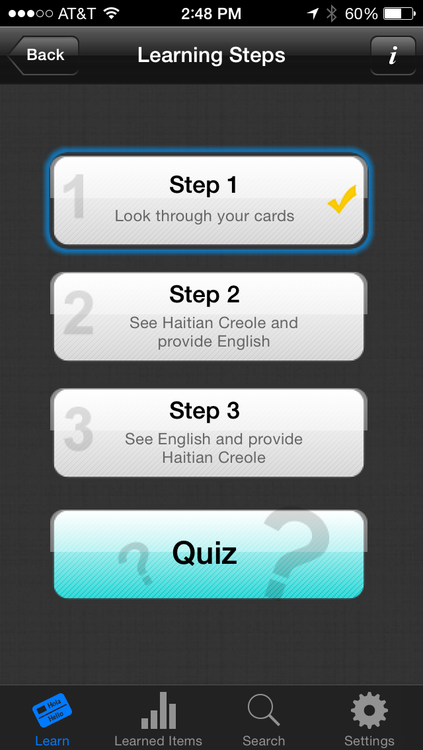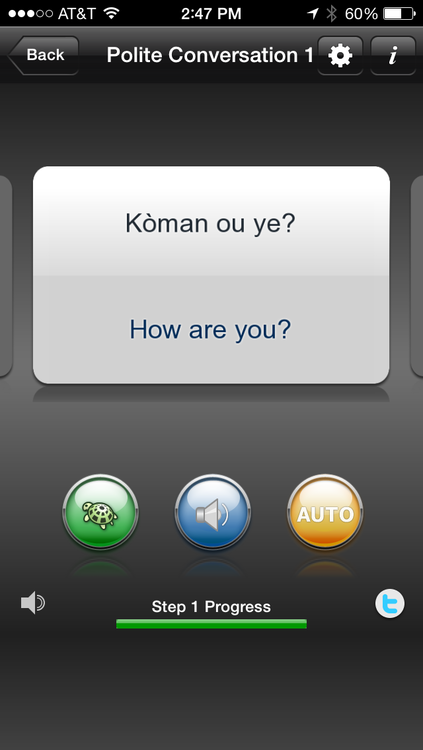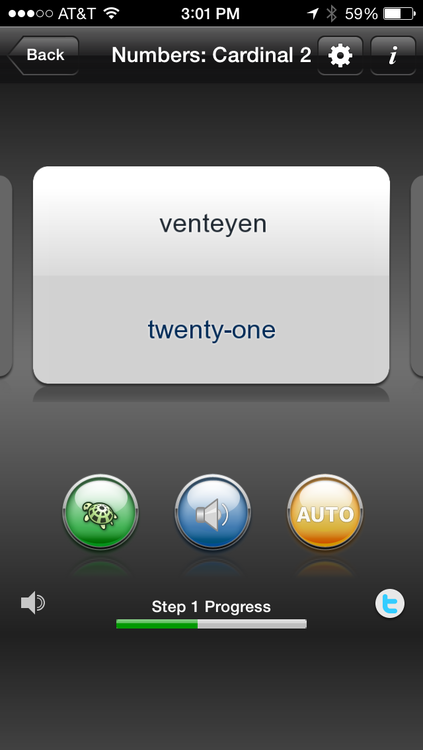Mwen te aprann kreyòl ayisyen nan ven èdtan!
Twenty Hours? Seriously? I have heard of taking 21 days to form a habit, but 20 hours seemed impossible! How can I possibly learn something new, something from scratch in just 20 hours? Where do I even begin?
Indeed, Josh Kaufman, in his book The First 20 Hours: How to Learn Anything…Fast, summarizes three key things that stop us from learning new skills. First, most people do not commit to learning anything specific. Second, learning new skills is often intimidating. Third, learning new skills is usually frustrating. Each of the three rings true for me. I tend to have a short attention span; thus, if I do not easily master a project or receive the instant gratification of learning, then I let it go. And then there is the problem of zeroing in on a specific area. It is easy to say, “I want to be a better person,” but what is the specific thing to take on to achieve that result?
After some thought and discussion with friends over dinner, I decided for this project to learn a language – Haitian Creole to be exact. For years, I have said I am going to learn Creole. After all, I spend 50% of my time in Haiti, and supposedly it is an easy language! No conjugating verbs! You simply add a word to indicate the tense!
Short of moving to Haiti, though, and finding a teacher, there are no easy ways to learn this language. Haitian Creole emerged from contact between French settlers and African slaves during the Atlantic Slave Trade in the French colony of Saint-Domingue. Though Haitian Creole is spoken by 90-95% of the country, French is seen as the “educated” man’s language. Until 1960, the Bible was only available in French, the language of the elite, and not Creole. Raymond Joseph of Les Cayes, Haiti, enrolled in Moody Bible Institute, and in 1960, he translated the New Testament and Psalms into Haitian Creole, under the umbrella of the American Bible Society.
Up until recently, translation tools were not available to the public to learn Creole, which continuously caused problems for missionaries and aid workers to relate and speak to Haitians. It was not until the earthquake in 2010 that the international community rallied for the inclusion of translation tools to promote communication. Still, Rosetta Stone does not include Haitian Creole in their repertoire, and Google Translate does not meet my learning style. I am a visual/spatial learner. If I can see it, I will remember the spelling, the side of the page the word is on, and will be more likely to remember the pronunciation. Finally, this week, I came across Byki, a language learning software, and it offers free lessons in Haitian Creole!
With each lesson, there are three steps:

Step One – Preview ten to twenty cards. Each card includes the Creole spelling of the word or phrase and its English translation. Also, the card speaks the Creole pronunciation, and the learner has the ability to slow down the pronunciation to hear each individual syllable.
Step Two – Recognize the word or phrase. Side one has the Haitian Creole word, and it is pronounced by the program. The learner must write the translation in English.
Step Three – Produce the translation. Side one has the English word or phrase, and the learner must write the translation in Creole.
On Sunday, I was so excited to find the learning software that I downloaded not just the first couple of lessons, but instead, I downloaded thirty lessons on my computer! Then I found the mobile app! I could learn on my phone while at work or in the bathroom! Yes, I completely overwhelmed myself. Instead of starting off slow, with an orderly schedule, I jumped in haphazardly. In essence, I wasted a day.
On Monday, I backed up and actually deleted all by the first few lessons. I spent one hour on each of the first four “Quick Starts.” I played the flash cards over and over, repeating many of the same words of greeting and conversation I have often heard. “Bonswa. Koman ou ye? Mwen tre byen, mesi.”

On Tuesday, I went back to the first four “Quick Starts,” and completed steps two and three of the lesson. I recognized the Creole words, and I was able to see the English words and give the Creole translation. I considered that a success, and downloaded the next “Quick Starts” along with the two “Meeting and Greeting” lessons. It occurred to me that these are the essential components to my interactions in Haiti, and I would like to engrain these greetings into my brain. Showing the everyday people I run across that I have taken the time to learn even a little of their language will signal to them that I care about who they are.
Wednesday, I downloaded lessons for numbers, months and weather. What I came to appreciate was the repetition and the stages each lesson goes through. It was one thing to hear and see the Creole and English language on one card, but then having to write the English words, and then the Creole translation for the English word truly helped me learn.

Thursday was “communication facilitation” lessons one through seven, and Friday, I went into quiz mode. What had I really learned and retained in this 20 hours of learning? Could I recall the basics? Were the “quick starts” still amongst my memory bank? I quizzed myself in each of the lessons I had downloaded. Clearly, I am not fluent in the language. I do not know the intricacies, nor have I even started down the path of verbs. I could not, at this point, put together a sentence on my own. However, I do have many nouns in my repertoire, and I can be conversational in my greeting.
As Kaufman encouraged, I plan to continue this by practicing an hour each day for the next month.[1] Practice does indeed make perfect, and by the time I return to Haiti in October, I want to make my Haitian brother smile!
[1] Josh Kaufman, The First Twenty Hours: How to Learn Anything…Fast (New York: Penguin Group, 2013), 258.
Leave a Reply
You must be logged in to post a comment.